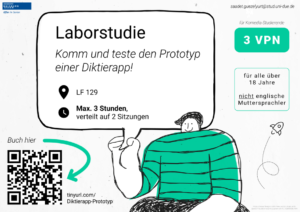Wintersemester 2023/24

Deliberate practice is a framework of expertise development or mastery which posits that in order to achieve superior performance in a task practice must be structured and supplemented with feedback. Both of these criteria have historically relied on expert mentor/s, such as in cases of any elite sports athlete. However, such facilities are unobtainable for the common folk which is where the domain of Computational Cognitive Modelling (of expertise) is promising. In this project, you will be acquainted (& challenged) to undertake this thesis by modeling a cognitive task using ACT-R, which is both a theory of common cognitive architecture and a cognitive modeling language based on the theory. The choice of the task will be left to the students as it enforces the basic understanding of the theory and the domain as well. ACT-R also provides a remote interface for Python or LISP which you will use to generate actionable/qualitative/meaningful feedback for anyone looking to learn the cognitive task (one you selected) using your application. You will also evaluate your model against an expert performer (human) and additional points will be provided for simulating expertise in the cognitive task (or any efforts to do with algorithms such as fast and frugal heuristics). Any experimental study involving multiple participants are welcome.
Teaching Form: TBA

Hackathons are time-bounded events (typically 1-3 days) with large participation, in which (small) groups carry out projects which they conceptualize, design, prototype or implement. “Learning” is often cited as one reason to organize or participate in Hackathons. However, we also know that it is necessary to plan for learning to ensure learning takes place. This Praxisproject is set to run in conjunction with a hackathon planned for this December. In the project we will prepare python based challenges for the hackathon participants framed in the style of an Arcade Game-machine. The idea is to build a virtual arcade machine with games in different development phases for the hackathon participants to work on. This way we can have built in challenges of different difficulty. So, as a group we will build: – a frame for the application: a virtual arcade machine – different games in different development phases (for example: Snake, Tron, Tetris, Pong) In the hackathon event we will mentor participants and we will use the event to get feedback on our challenges to (potentially) improve them after. Beyond that we can also use the event for further research.
Teaching Form: Blended learning

This project aims to explore the design, use and impact of generative AI systems, and specifically text-generators and language models, from the perspective of human-AI interaction and FATE (Fairness, Accountability, Transparency and Ethics) and in relation to learning. In particular, we aim to explore the interactions between humans and machines as mediated by text-generators using Chat-GPT as the primary example and experiment with text-generation algorithms and establish guidelines of good practice in terms of meaningful communication. Finally we will reflect on the role of AI technologies as facilitator of human-machine and human-human information exchange, communication, and collaboration.
For this project, we will work in groups of 4 students on a predefined topic (each group will be assigned a different topic). During the first weeks, we will provide an overview of the project, its goals, and related theoretical and practical concepts.
Then, the groups will work towards three milestones:
a. An initial presentation of their ideas, strategies and workplans to address the project’s topic;
b. A mid-term presentation of the work-progress up to that point
c. A final presentation of the finished project and a written project report in the form of a scientific article.
Teaching Form: Blended learning

In this seminar, we will explore the space between Data Science and Education! In particular, we will have an overview of what data science in education can look like and why education as a data science as an application field is not as straightforward as it may sound! We will discuss the data cycle for transforming data to useful information, we will try out data mining approaches and we will discuss and contextualize our findings. Finally, we will explore the state-of-the-art research in Educational Data Mining aiming to draw new and exciting directions!
Teaching Form: TBA



